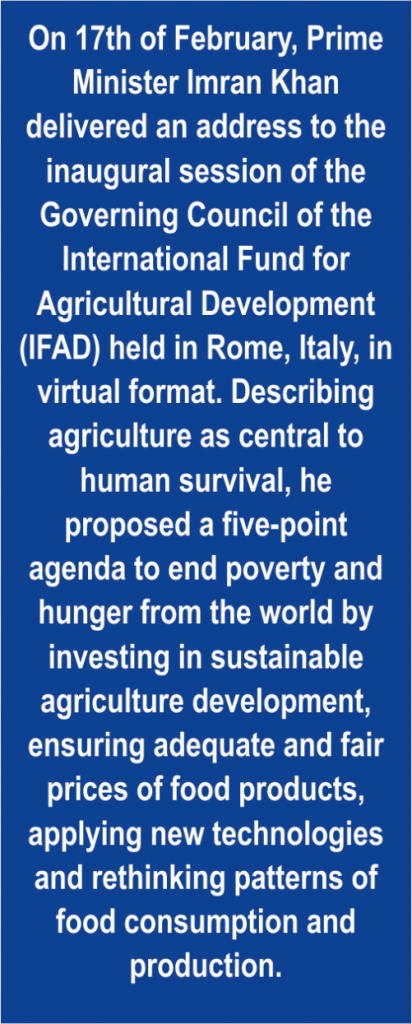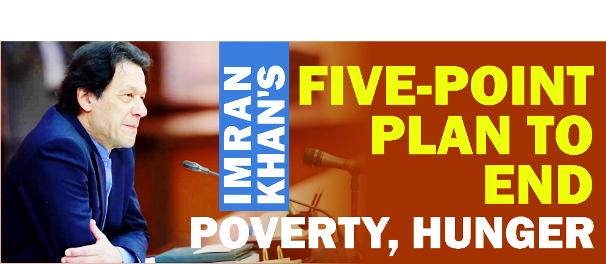IMRAN KHAN’S
FIVE-POINT PLAN TO END
POVERTY, HUNGER
In his virtual address at the International Fund for Agricultural Development (IFAD) moot, Prime Minister Imran Khan reminded the world that some 600 million people suffer from hunger, and 100 million will be pushed into poverty because of the impact that the pandemic has had on their lives. Even more worrying is that some estimates put the numbers even higher. In his address, the PM floated an ambitious five-point agriculture development agenda for the world that would, in any other year, seem easily agreeable for most countries.
 1. We need to invest in sustainable agriculture infrastructure to facilitate transport, production and distribution of agricultural inputs and food products, for which the ‘green lanes’ created by China are a good example.
1. We need to invest in sustainable agriculture infrastructure to facilitate transport, production and distribution of agricultural inputs and food products, for which the ‘green lanes’ created by China are a good example.
2. Governments need to more actively ensure adequate and fair prices for agricultural and food products. “The so-called magic of the marketplace should be balanced with a very visible hand of the state. We in Pakistan have suffered from market manipulations by monopolists and hoarders. Farmers should not be left to the mercy of the corporations; at the same time, international agricultural trade must be rationalised. The huge agriculture subsidies provided by certain richer economies distort global markets and make it impossible for farmers in the developing countries to compete.
3. The new and breakthrough agricultural technologies and techniques must be consciously applied to enhance food production, ensure efficient usage of water and land, and, above all, improve seed quality. IFAD and the FAO can play an important role in this context.
4. The adoption of digital technologies is as vital in agriculture as in other economic sectors. Ensuring internet and broadband access to the rural areas will be vital for their integration into national and global supply chains.
5. We must rethink our patterns of food consumption and production. We can eat better and many of us would do well to eat less. We can produce food with greater respect for nature, we can stop the pollution of our lakes, rivers and oceans. We can produce more with less water and without dangerous chemicals.
About IFAD
The International Fund for Agricultural Development (IFAD) is an international financial institution and a specialized agency of the United Nations. It formally came into existence on 30 November 1977, on which date the agreement for its establishment entered into force. It has its headquarters in Rome, Italy. IFAD and its operations are governed by the Agreement Establishing the International Fund for Agricultural Development. Membership in the Fund is open to any member state of the United Nations or any of its specialized agencies, or of the International Atomic Energy Agency (IAEA). The Fund’s resources come from Member contributions, special contributions from non-Member States and other sources, and funds derived or to be derived from operations.
The objective of the Fund is to mobilize additional resources to be made available on concessional terms primarily for financing projects specifically designed to improve food production systems, the nutritional level of the poorest populations in developing countries and the conditions of their lives. IFAD mobilizes resources and knowledge through a dynamic coalition of the rural poor, governments, financial and development institutions, non-governmental organizations and the private sector, including cofinancing. Financing from non-replenishment sources in the form of supplementary funds and human resources forms an integral part of IFAD’s operational activities.
IFAD has 177 member states that meet every year to take part in IFAD’s Governing Council, our highest decision-making body. It works in partnership with the Organization of the Petroleum Exporting Countries (OPEC) and members of the Organisation for Economic Cooperation and Development (OECD).
 Jahangir's World Times First Comprehensive Magazine for students/teachers of competitive exams and general readers as well.
Jahangir's World Times First Comprehensive Magazine for students/teachers of competitive exams and general readers as well.



